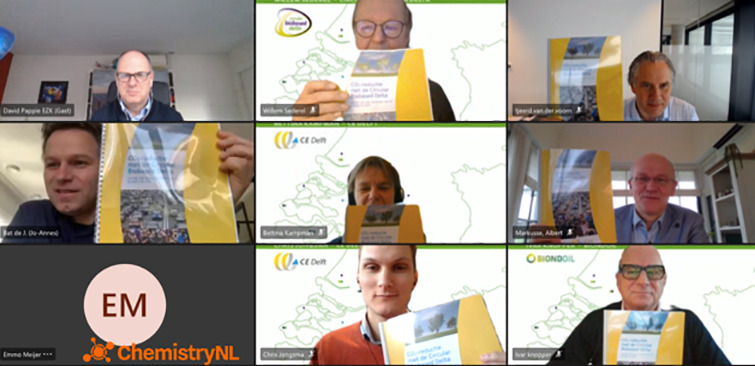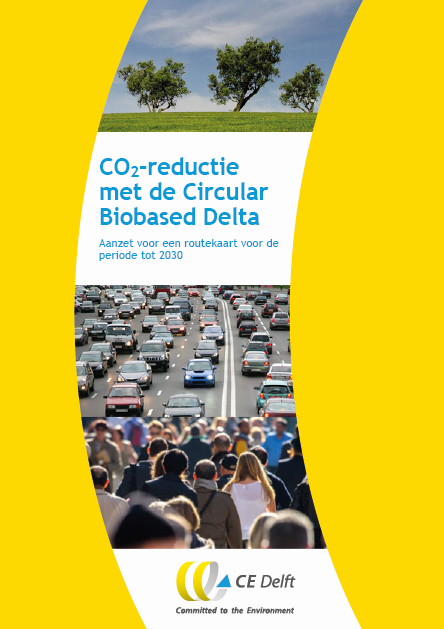Biobased-circular economy in Delta region makes substantial contribution to national climate goals
With 20 biobased circular projects, the process industry can achieve more than half of its climate targets in the Delta region. This is the conclusion of research commissioned by the Circular Biobased Delta, supported by the provinces of North Brabant, Zeeland and South Holland.
In the presence of members of the provincial executive and representatives of industry and education, Willem Sederel, chairman of the Circular Biobased Delta presented the roadmap to the Top Team Chemicals. This roadmap is the first study in the Netherlands that provides insight into the effect of a portfolio of bio-based circular projects on CO2 emission reduction. If the bio-based circular projects are realised, it will be possible to save a total of 5.4 million tonnes of CO2-eq per year. And thus make a substantial contribution to the national climate objectives for 2030.
Outline of the Route Map
Commissioned by the Circular Biobased Delta and financed by the three provinces, independent research and consultancy firm CE Delft has investigated how much CO2 emissions the project portfolio of the Circular Biobased Delta and its partners can save compared to current fossil production processes. Jo-Annes de Bat, member of the Provincial Executive of Zeeland: “The results of this study make the potential and the importance of the project portfolio for the national climate objectives more tangible and allow companies, policymakers and the Circular Biobased Delta to take targeted follow-up steps. We can also boost new projects in a targeted way so that the next target of 10 million tonnes of CO2 reduction by 2030 will be achieved.”
Unique knowledge position with export potential
Martijn van Gruijthuijsen, member of the Provincial Executive of North Brabant, underlines CE Delft’s conclusion that biobased circular projects are much more than a way to reduce CO2 emissions between now and 2030:”By committing to a sustainable green chemistry sector in the south of the Netherlands now, we are working on the economy of tomorrow and the day after. The future is circular and our industry must also work in a sustainable way to become future-proof. In this way, we will preserve employment in these sectors and build up a unique knowledge position for Europe and the world.”
Appeal for support from the Dutch government and ChemistryNL
During the online meeting, Willem Sederel called on the government and ChemistryNL to provide support for the bio-based-circular transition: “It is common knowledge that entrepreneurs and companies in the circular bio-based economy are confronted with numerous barriers: financing, legislation and regulations, the social debate surrounding biomass, sustainability framework(s) for biobased raw materials and market demand, to name the most important. We are asking the government and the Topteam Chemistry for their support.”
We specifically ask the government for financial resources to enable scaling-up, help in improving the image of biobased raw materials, implementation of practical sustainability frameworks and adjustments in the legislation and regulations for the application of biomass. We ask the Topteam Chemistry to provide more knowledge, expertise, network and guidance to smaller, innovative entrepreneurs. There should also be more emphasis on circular biobased themes in the national knowledge and innovation agenda and within the trilateral agenda Netherlands – Flanders – North Rhine-Westphalia.”
Cooperation crucial
The deputies and entrepreneurs present at the meeting endorsed the need for good cooperation and partnership with the State and Topteam Chemistry to help realise the roadmap in the coming years. Adri Bom-Lemstra, member of the Provincial Executive for South Holland: “The transition to a circular economy can only succeed if governments, knowledge institutions and businesses work closely together. And that cooperation goes beyond provincial boundaries. This roadmap shows what we can achieve. It’s great that we can present this today, now let’s get to work and make a difference together.
Hand over roadmap to Topteam Chemistry
The Topteam Chemistry is responsible for the knowledge and innovation agenda for chemistry in the Netherlands. In addition to Emmo Meijer, figurehead and chairman, it consists of David Pappie, director of Top Sectors & Industrial Policy at the Ministry of Economic Affairs and Climate Change, Tom van Aken, CEO of Avantium on behalf of the SME sector and Professor Bert Weckhuysen of Utrecht University on behalf of the scientific community.
On receiving the roadmap, Emmo Meijer emphasised the importance of the chemical industry for society in general and for achieving the climate targets in particular: ‘It is very important that the chemical industry is not only part of the problem, but also part of the solution. The sector has committed itself to this by means of the roadmap 2050 Chemistry for Climate: the initiative of Circular Biobased Delta provides an innovative and impactful interpretation of this that may be followed by other regions.
Implementation Agenda 2020-2030 CBBD
The project portfolio is part of the implementation agenda 2020-2030 of the Circular Biobased Delta. It mostly concerns projects of smaller innovative players whose CO2 emission reduction comes on top of the efforts of the existing business community. However, the many initiatives are in various stages of development and often still need years to reach maturity.
More information about Circular Biobased Delta.






